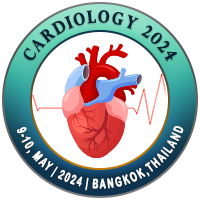
Amber Kumar
AIIMS, IndiaTitle: Impact of Asthma phenotypes on myocardial performance and Pulmonary Hypertension in Children and Adolescents with moderate to severe persistent Asthma
Abstract
Background: Using echocardiography, we assessed the impact of clinical asthma phenotypes on myocardial performance and PH in children with asthma.
Materials and Methods: Sixty children with moderate or severe persistent asthma and 60 age and gender-matched healthy controls were enrolled. As per clinical phenotypes, children with asthma were classified into early wheezers (n = 30) and late wheezers (n = 30). Pulmonary function tests and echocardiography - conventional and Pulse Waves were performed.
Results: Children with asthma had significant RVDD and higher incidence (33%) of PH. Myocardial Performance Index (MPI) was poorer in asthmatics, 0.41(0.04) than in controls, 0.38(0.03). Measures for PH, such as TR gradient and Pulmonary Artery Pressure, were significantly higher in cases. Clinical asthma phenotypes showed no difference in Left Ventricular Ejection Fraction between early 64.3% (4.6) and late wheezers 65.6 (4.4). MPI was better in late wheezers 0.41 (0.05) than in early wheezers 0.40 (0.03). TR gradient, TR velocity, and PAP were significantly higher in the early wheezers. The odds ratio for the development of Pulmonary Hypertension was 0.74 (CI 0.25 – 2.17), and for the development of RVDD was 3.2 (CI 0.77 – 13.8), both in favor of early wheezers.
Conclusion: Children with asthma, in general, and early onset wheezers, in particular, are at increased risk of developing PH and RVDD.
Biography
Dr Amber Kumar, MD Pediatrics, did his post-doctoral fellowship in Pediatric Cardiology (FNB) from the National Board of Examination. He is currently serving as an Associate Professor at All India Institute of Medical Sciences, Bhopal, in the Pediatric Cardiology subspeciality. He has over 45 publications and he is working on many funded projects of ICMR/UNDP/WHO.

